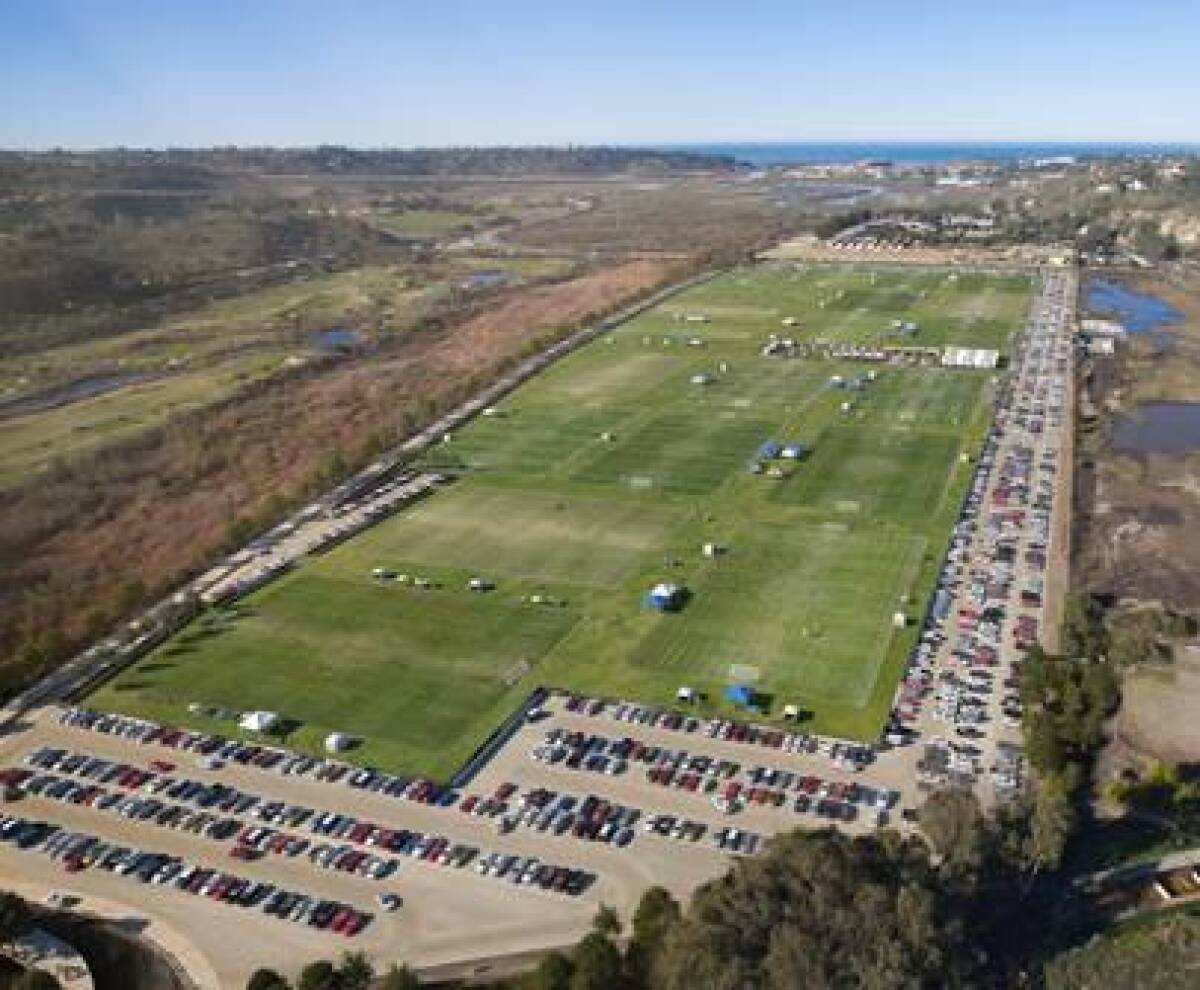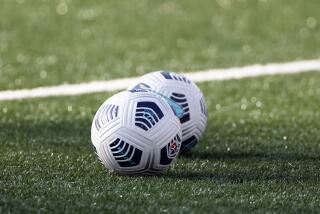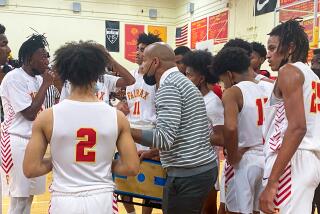San Diego youth soccer clubs want to start playing games

- Share via
College sports across California have been postponed for the fall season. So have junior college sports. So have high school sports.
But youth sports teams quietly continue to practice, and several top soccer clubs in San Diego want to move to a full-contact model with hopes of starting their league seasons in October.
“We just felt like sitting around and waiting wasn’t the right thing to do,” said Brian Enge, CEO of Surf Cup Sports, which operates the county’s two largest field complexes in Del Mar and Oceanside. “If we did that, the kids wouldn’t have a voice. ... They want to play.”
Earlier this week, the Surf submitted a proposal to San Diego city leaders for a pilot program allowing a half-dozen clubs to play games in a controlled environment with weekly testing to further gauge the spread of COVID-19. Also released was an eight-week study involving nearly 7,000 local youth players and coaches that reported only 15 confirmed cases and no team outbreaks of the virus.
San Diego has been the most aggressive among California’s most populated counties in returning to youth sports, the first to permit practice in a physically-distanced setting in early June under the state’s “day camp” protocol in the absence of a specific youth sports guidance.
Orange, Riverside and San Bernardino counties all subsequently shut down youth sports last month after the California Department of Public Heath issued a directive saying the day camp protocol was an inappropriate application and recreational sports were not allowed. San Diego County essentially ignored that and allowed youth sports to continue. Some clubs from neighboring counties even rented fields here and drove south for practice.
On Aug. 3, three months after it was first requested, Gov. Gavin Newsom and the CDPH issued an “interim guidance” for youth sports that allows for practicing with proper distancing but no competition.
“We kept hearing from people in Georgia, Florida and Texas, where they are playing games and tournaments, that kids were playing against each other every day and no one had seen team outbreaks,” Enge said. “We started tracking everything at Surf. We wanted to know if we were actually doing the right thing for our kids (by returning to practice). Then we reached out to other clubs and asked if they were tracking the same data.”
The results: six clubs, eight weeks, 6,560 players aged 6 to 18, 263 coaches, 143,000 “soccer sessions.” The clubs reported 13 confirmed cases among players and two among coaches, and “each of the identified cases all were found to have been transmitted outside of the soccer sessions.”
Some teams were sidelined as long as 14 days after a player had a positive test. The clubs didn’t have the capacity to conduct blanket testing, although some parents independently had their children tested.
Also notable: Most clubs abided by state and county distancing guidelines for practice, but several are known to be scrimmaging to simulate game conditions. The data, then, likely includes incidences where players were coming closer than 6 feet without a mask.
“We’re not claiming for a second that this is perfect or conclusive evidence,” Enge said. “What we are saying is we believe we have enough data to talk with the powers that be about moving to the next phase. This is the first piece of data like this that we’ve seen. We think it’s enough to at least move the conversation forward.”
Also participating in the study were Albion SC, which operates out of San Diego’s Robb Field; San Diego Soccer Club based in inland North County; City SC of Carlsbad; Rebels SC of Chula Vista; and the Oceanside Breakers.
Michael Duggan, director of soccer operations for City SC, said one case at his club involved an asymptomatic player whose family got tested before visiting a grandparent. The player had practiced all week, but Duggan said no one else on the team got sick or subsequently tested positive.
“I’d love to know the data that Gov. Newsom is reading that is preventing us from playing,” Duggan said. “Unless they have contradictory data, why can’t we do internal scrimmaging and monitor it for a few weeks and then maybe move forward (with league games)? Let us collect the data and pass it up to you.”
Asked in an email why scrimmaging and games are not allowed, a spokesperson for the CDPH referred to the Aug. 3 youth sports guidance.
“For sports that cannot be conducted with sufficient distancing or cohorting,” it says, “only physical conditioning and training is permitted and ONLY where physical distancing can be maintained. Conditioning and training should focus on individual skill-building.”
For youth soccer, the summer is devoted to tournaments that are a major revenue source for youth clubs, which typically operate as nonprofit organizations with little or no cash reserves. The league season begins in September and ends before Thanksgiving.
Enge said Surf Cup Sports has so far canceled or postponed 22 tournaments hosted by local clubs that were scheduled across the 46 fields at the Del Mar and Oceanside complexes, amounting to an estimated $2 million to $3 million in combined lost income. The Surf Cup, which annually attracts hundreds of teams from across the nation, has been postponed several times from its usual July slot, most recently to late September.
“The demand is through the roof,” Enge said. “Teams, players, parents want to play. We have teams from every state in the West and even teams from the Midwest saying, ‘Just tell us when and where, and we’ll be there.’ ”
More to Read
Get our high school sports newsletter
Prep Rally is devoted to the SoCal high school sports experience, bringing you scores, stories and a behind-the-scenes look at what makes prep sports so popular.
You may occasionally receive promotional content from the Los Angeles Times.







